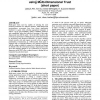Free Online Productivity Tools
i2Speak
i2Symbol
i2OCR
iTex2Img
iWeb2Print
iWeb2Shot
i2Type
iPdf2Split
iPdf2Merge
i2Bopomofo
i2Arabic
i2Style
i2Image
i2PDF
iLatex2Rtf
Sci2ools
ATAL
2008
Springer
2008
Springer
Identifying beneficial teammates using multi-dimensional trust
Multi-agent teams must be capable of selecting the most beneficial teammates for different situations. Multi-dimensional trustworthiness assessments have been shown significantly beneficial to agents when selecting appropriate teammates to achieve a given goal. Reliability, quality, availability, timeliness and compatibility define the behavioral constraints of the multidimensional trust (MDT) model. Given the MDT model in this research, an agent learns to identify the most beneficial teammates by prioritizing each dimension differently. An agent's attitudes towards rewards, risks and urgency are used to drive an agent's prioritization of dimensions in a MDT model. Each agent is equipped with a Temporal-Difference (TD) learning mechanism with tile coding to identify its optimal set of attitudes and change its attitudes when the environment changes. Experimental results show that changing attitudes to give preferences for respective dimensions in the MDT offers a superior mea...
ATAL 2008 | Beneficial Teammates | Intelligent Agents | MDT Model | Multi-dimensional Trustworthiness Assessments |
| Added | 12 Oct 2010 |
| Updated | 12 Oct 2010 |
| Type | Conference |
| Year | 2008 |
| Where | ATAL |
| Authors | Jaesuk Ahn, Xin Sui, David DeAngelis, K. Suzanne Barber |
Comments (0)

